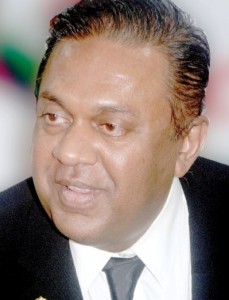A Brief Colonial History Of Ceylon(SriLanka)
Sri Lanka: One Island Two Nations
A Brief Colonial History Of Ceylon(SriLanka)
Sri Lanka: One Island Two Nations
(Full Story)
Search This Blog
Back to 500BC.
==========================
Thiranjala Weerasinghe sj.- One Island Two Nations
?????????????????????????????????????????????????Wednesday, August 30, 2017
Editors To Be Held Liable For Advertisements Under Proposed Media Regulatory Law
The proposed Media Regulatory draft law pushed by the Information Department provides in clause 12 of the draft, that “the
editor-in-chief, as designated by news media outlets, shall be
accountable for all the content disseminated by the news media outlet,
including advertisements,” Colombo Telegraph learns.
The draft also states that ‘the editor-in-chief shall be accountable to
the Independent News Media Council for all the content included in the
news media outlet regardless of whether or not any breach of any Code of
Practice adopted by the Independent News Media Council is directly
attributable to the editor-in-chief.
Asked
to comment, an editor stated that a lot of discretion is given to the
News Media Council established under this draft and that it can be used
as a political tool by the Government. Holding editors liable for even
advertisements is contrary to normal practice, he added.
Earlier, Colombo Telegraph had exposed the fact that the
draft had contained a clause that a journalist could be forced to
disclose sources on a judicial order. Following criticism, a revised
clause now reads that “No
court may require a journalist to disclose the identity of a
confidential source who has provided information to that journalist, nor
may any adverse inferences be drawn against a journalist for any
refusal to disclose a confidential source.”
Colombo Telegraph had highlighted this
clause, pointing to the problems that may arise if a court is given the
power by law to order a journalist to give up his/her sources. This was particularly so as the Supreme Court had ruled that source protection is part of the right to information. These
questions were raised in the context of the Sri Lanka Press Institute
(SLPI), an umbrella organization of editors and media activists
remaining quiet while the proposed media draft regulatory law was being
promoted by the Director General, Information Department Ranga
Kalansooriya and IMS country programme manager Nalaka Gunewardene without formal involvement of the Ministry of Media.
A
doubtful group calling itself the National Secretariat for Media Reform
(NSMR) funded by an international non-governmental organization,
International Media Support (IMS) had been given the task. Its website (nsmrlk.org/) stated that the SLPI had also collaborated with it.
The
NSMR website went off line shortly after the Colombo Telegraph exposure
when it was pointed that some of their members had dubious
qualifications while others were not recognized members of either the
legal or media professions. NSMR has removed the relevant information
from its website. Even at this point, the website does not disclose
details of its members under ‘About us.’
Despite
the revision on the forced disclosure of sources which was prompted by
the Colombo Telegraph exposure while the SLPI remained asleep, the draft
is still concerning. DG,
Information Kalansooriya has tried to justify the proposed News Media
Council to be established by this draft to regulate the print and
broadcast media by saying that this will be similar to the RTI
Commission set up under the internationally hailed RTI Act, No 12 of
2016. But media activists speaking to Colombo Telegraph reiterated that
this explanation is not correct as the RTI law was widely accepted with
the RTI Commission members of high standing while this is a problematic
draft and there is no guarantee as who will be appointed to this
Council.
The SLPI has yet not activated
itself on the matter apart from its CEO Kumar Lopez issuing a short
press statement recently saying that the majority of its members agreed
on the need for self-regulation. A senior independent news editor told
Colombo Telegraph that the SLPI has lost public credibility because of
lack of direction and focus. “They only have trainings, sometimes
one-off public lectures attended by the same crowd. It is not seen as a
critical meeting place for ideas and discussions by journalists. The CEO
is someone whom they got from the private sector as no one else came
forward and he only thinks of profits. He runs this way and that way
helplessly whenever he is told to,” he said.



